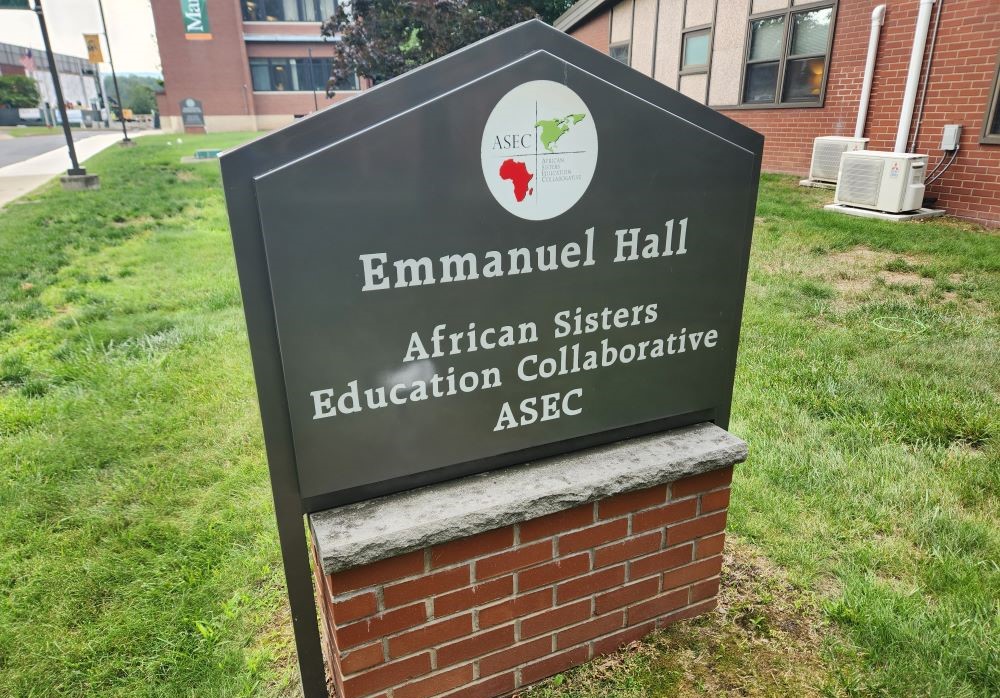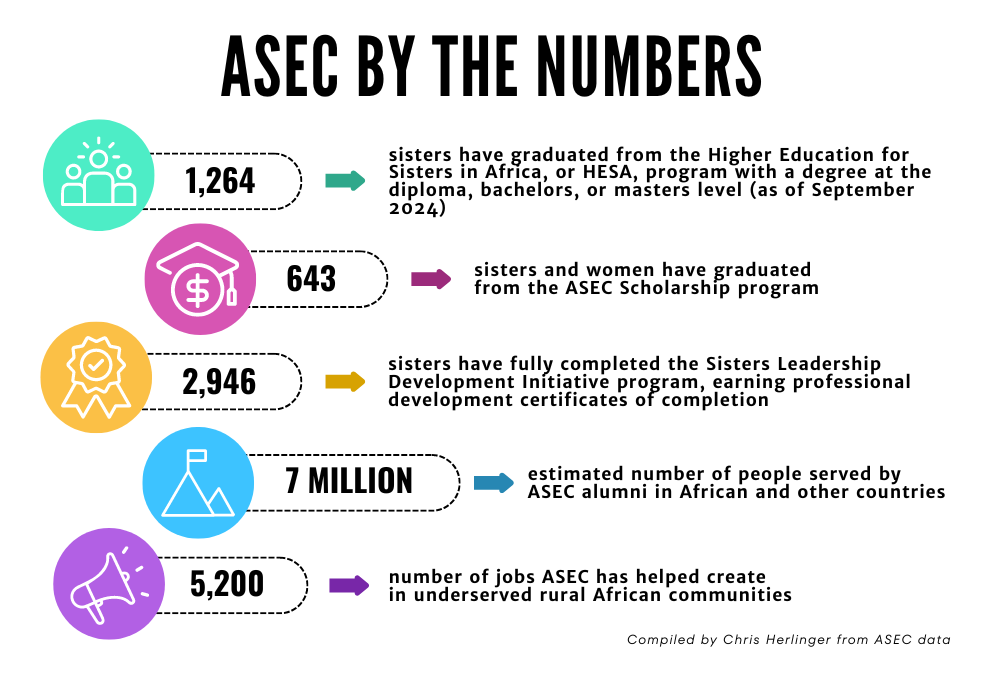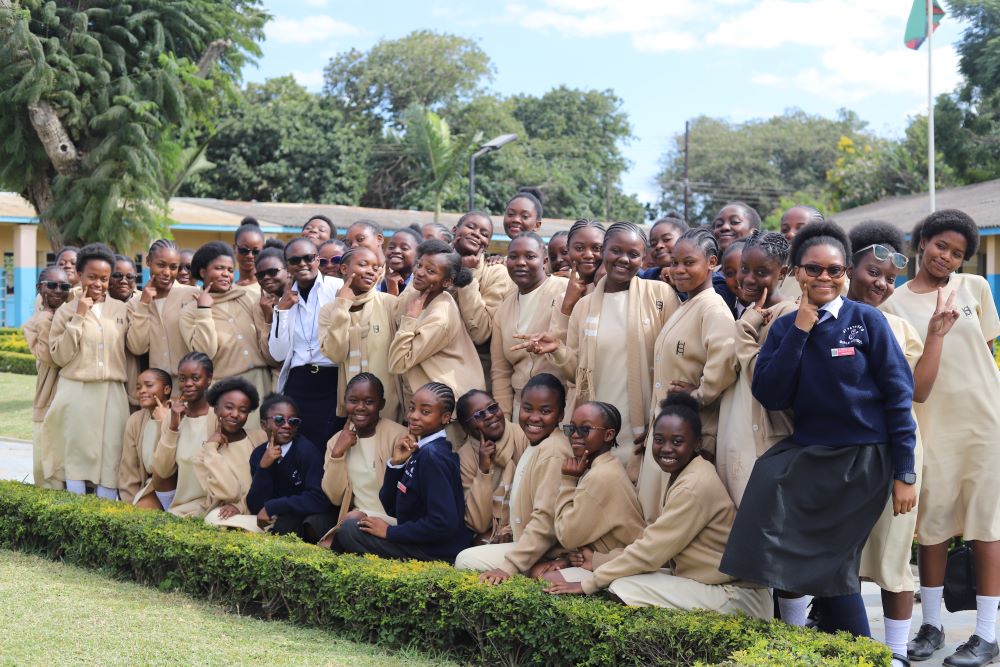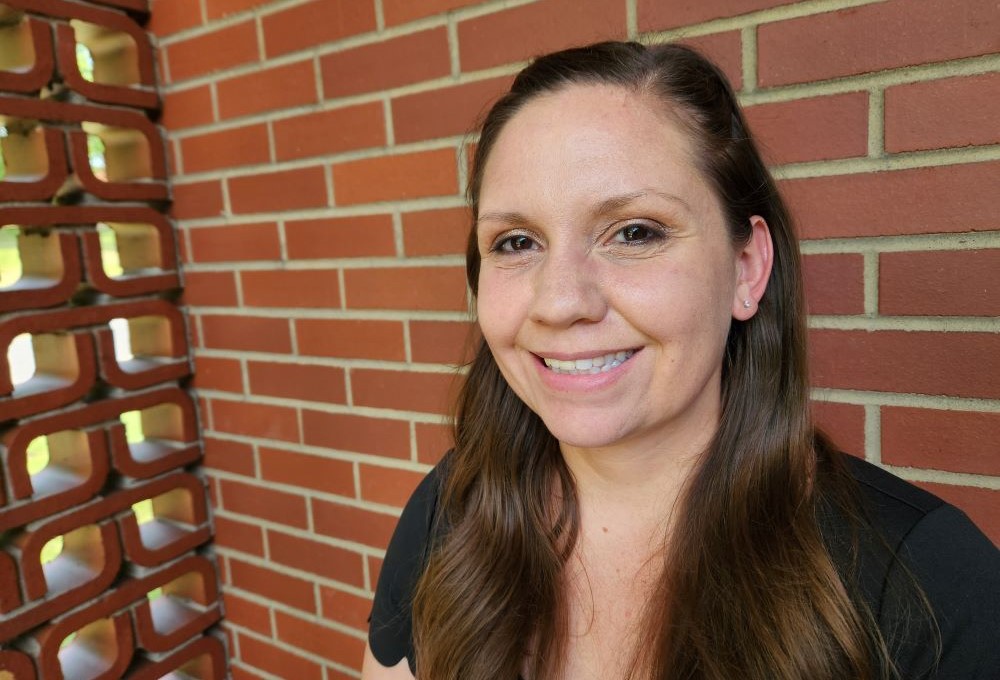
The African Sisters Education Collaborative, or ASEC, is located on the campus of Marywood University in Scranton, Pennsylvania, and is celebrating its 25th anniversary this year. (GSR photo/Chris Herlinger)
Initially, the African Sisters Education Collaborative, or ASEC, brought sisters from Africa to the United States for training and technology skills. That grew into offering technology training in countries in West and East Africa, and served as the foundation for ASEC's largest program: the Sisters Leadership Development Initiative, which provides leadership and technology training.
The initiative has gone through a steady transformation, said ASEC Executive Director Sr. Draru Mary Cecilia. In 2004, ASEC hosted its first conference, "Women Religious Bridge the Gap: Collaborative Education for Service," near Philadelphia. For this conference, ASEC hosted 18 sisters from Africa to listen to their pastoral needs and provide technology demonstrations, she said.
The first basic technology workshops in Africa were held for 36 sisters in summer 2005 in Kenya and Ghana. A year later, five African sisters traveled to the U.S. to receive training to become supervisors and instructors of ASEC's computer labs in Africa.
In 2007, Draru said, ASEC received its first grant from the Conrad N. Hilton Foundation to implement the leadership program. (The foundation is also the major funder of Global Sisters Report.) With this grant, Draru said, "workshops were formally established to be held in Africa. Since that time, all workshops have either been held in person in Africa or online."
The program offers technology, administration and finance training to sisters through three one-month workshops over three years. It helps sisters gain practical skills and confidence for leadership roles in their congregations and communities.
The training is supplemented by field visits to model sites, which include sustainable farms, community hospitals and government institutes. The sisters are further supported when they can take advantage of three-day alumnae education and networking workshops that, among other things, can help them broaden their acquired skills.
In Kenya, Sr. Josephine Muthoni Kwenga, an alumna of ASEC's Sisters Leadership Development Initiative program, has started agricultural projects to address food insecurity and unemployment. Kwenga grows corn, beans, and vegetables such as cabbage, potatoes, onions and kale. These projects provide local communities with the knowledge and resources to grow their own food, leading to sustainable livelihoods and improved nutrition.
"ASEC has given us the tools [knowledge] not just to preach, but also to practice and teach sustainable living," said Kwenga of the Sisters of St Joseph of Tarbes. "Through our agricultural programs, we are not only feeding the hungry but also empowering people with the skills to sustain themselves."
Kwenga said that ASEC sponsored her education in 2015 through the SLDI program for an administration course, and in 2022, ASEC sponsored her education in the Higher Education for Sisters in Africa, or HESA, program. This allowed her to pursue a master's degree in social transformation at Tangaza University in Kenya. She also has received other short trainings courtesy of the Association of Sisterhoods of Kenya, or AOSK.

(GSR graphic/Olivia Bardo)
"The greatest benefit I received from all these is the skills in projects, proposal development and writing," she said, adding those skills were further improved by PRISMA Rome, a Claretian initiative that provides project management and fundraising training. "But I am who I am today in terms of service and support for my congregation because of ASEC and AOSK," she said. "I hold the two very dear in my heart and life."
Higher education
The second program, Higher Education for Sisters in Africa (HESA), provides opportunities for sisters to access higher education (diploma, undergraduate and master's degrees) through partnerships with institutions in Africa or through online programs with American institutions.
Draru said that the U.S.-partner institutions play an important role in the online-onsite education model, saying all U.S. partner institutions for online-onsite partnerships are ASEC corporate members. She said the program's "online-onsite" model uses an innovative design "to deliver bachelor's degree programs in select fields of study through partnerships between United States and African institutions."
This model of study, Draru said, is offered to sisters serving select countries — Kenya, Uganda and Zambia in East Africa, and Cameroon, Ghana and Nigeria in West Africa — where access to information and communications technology make online study feasible
Programs of study in the online-onsite model, Draru said, are restricted to bachelor's level study and limited to specific degree programs, such as education and business administration.
To qualify, sisters are recruited simultaneously to participating institutions in the United States and Africa which are partnered to deliver an online-onsite hybrid degree program.
Sisters typically complete 27 credits online over one full year of study at the U.S. partner institution. After successfully completing their online coursework, the sisters transfer to the partner institution in Africa to complete their degrees onsite. The sisters' degrees are conferred from the partner institution in Africa.

Sr. Angela Ngwenyufu, a member of the Handmaid Sisters of the Blessed Virgin Mary, poses for a photo with her students at St. Patrick's Secondary Girls School in Lusaka, Zambia, on May 25. (GSR photo/Doreen Ajiambo)
Courses taken online at the institution in the United States, Draru said, are preselected to correspond with the curriculum at the degree-conferring institution in Africa, where they are accepted as transfer credits when students transition to onsite study.
"This model of study is highly rated in satisfaction amongst sister participants," Draru told GSR, "with 93% indicating that online instruction at the U.S. institution was an effective way for them to learn."
Some 2,300 sisters have participated in the HESA program, with nearly half studying in the field of education, according to ASEC statistics. The top ministries are teacher, administrator or bursar. About 1,300 sisters have completed degrees under the program, and half have won degree awards or honors.
In Ghana, Sr. Mavis Ackaah Mensah, a HESA graduate, serves as the senior finance officer and head of accounting at Infant Jesus Catholic Clinic in Kasoa, a town in central Ghana. She has successfully transformed her health clinic into a model of efficiency and care.
Mensah's passion for accounting was ignited at the beginning of her ASEC program in 2017. Since completing the training, she has applied her knowledge and skills in accounting and health care to ensure safe, quality care.
"Thanks to my new skills, I have been able to secure funding for essential medical equipment and enhance patient care," said Mensah, a member of the Society of the Infant Jesus. "The training I received through ASEC has been invaluable. It has empowered me to manage our health center more efficiently, secure funding and expand our services to reach more people in need."
As the clinic's head of accounting and the senior finance officer, Mensah collaborates with medical professionals to maintain accurate financial records. She oversees the clinic's short- and long-term financial goals, manages tax filings, and produces financial reports while upholding patient privacy and confidentiality.
Scholarships
ASEC's Scholarship Program provides aid to complete secondary school or higher education relevant to sisters' ministries. The program began in 2012 in Tanzania, where 65% of sisters did not have secondary education. The program later expanded to Malawi, Zambia, Ghana, Kenya, Lesotho and Cameroon. (The Kenya program supports doctoral work.)
The example of Tanzania is extreme, but Rosemary Shaver, a senior ASEC program manager, notes that three-quarters of the sisters in the countries where ASEC works are under-educated — illustrating the ways in which women and girls are "marginalized in education in the countries we're working in."

Tara Lopatofsky is senior program manager at the African Sisters Education Collaborative. (GSR photo/Chris Herlinger)
Scholarships allow sisters to become more effective in their ministries to those who are economically poor and marginalized.
By completing their secondary school work, "many scholarship recipients go on to higher levels of education, making them even more effective agents of change in the poor communities they serve," noted an online description of the program.
Shaver notes the personal milestone these degrees and diplomas can mean to the sisters — and to those closest to them. "It's so exciting to see these sisters graduate because many of them are the first ones in their families to be educated," said Shaver, who herself was the first member of her family to attend college and has a doctorate in education
Service learning
In the Service Learning Project, students and sisters from ASEC-affiliated institutions in the United States participate in annual service trips to Africa, alongside mentors, for three weeks.
Advertisement
Research opportunities
The Research Initiative aims to promote research on Catholic sisters in Africa, increase their visibility, research skills, and engage them in research projects. It also seeks to develop ASEC as a central repository of data related to women religious in Africa.
"ASEC hoped to develop a network of professionally qualified women who could engage in offering competent service and positively influence human development in both the private and public spheres," said Draru, adding that "with the confidence that comes from possessing knowledge, skills and wisdom, blended with their deep love of and commitment to serve humanity."
Seeing the effects of ASEC's work puts the numbers and programming into human perspective, said Tara Lopatofsky, senior program manager for monitoring and evaluation.
She recalls visiting a new health clinic in rural Zambia during a monitoring site visit that was staffed by sisters who had benefited from ASEC support. Lopatofsky described the clinic's locale as perhaps "the most rural health clinic I could go to."
"People were lined up to go into that clinic," she recalled. "Just hearing how they loved the sisters and the difference it made in their lives, that affected me."





